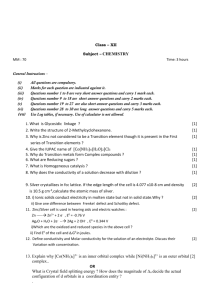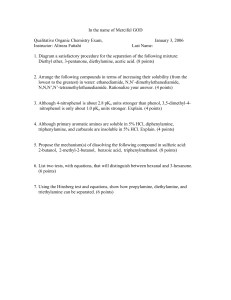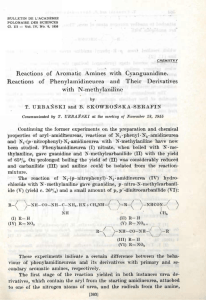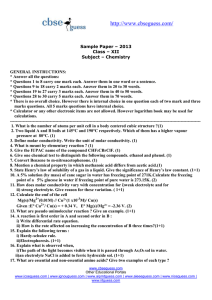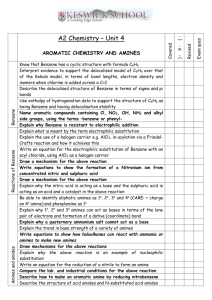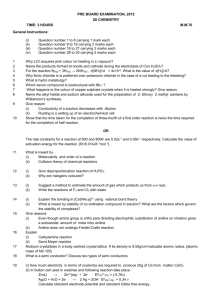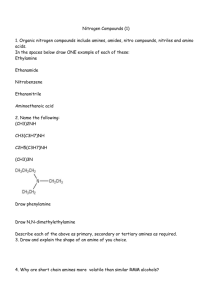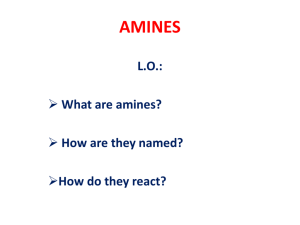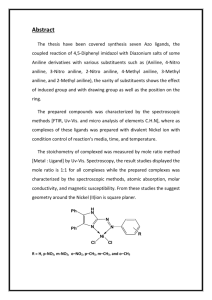AMINES Unit - 13
advertisement
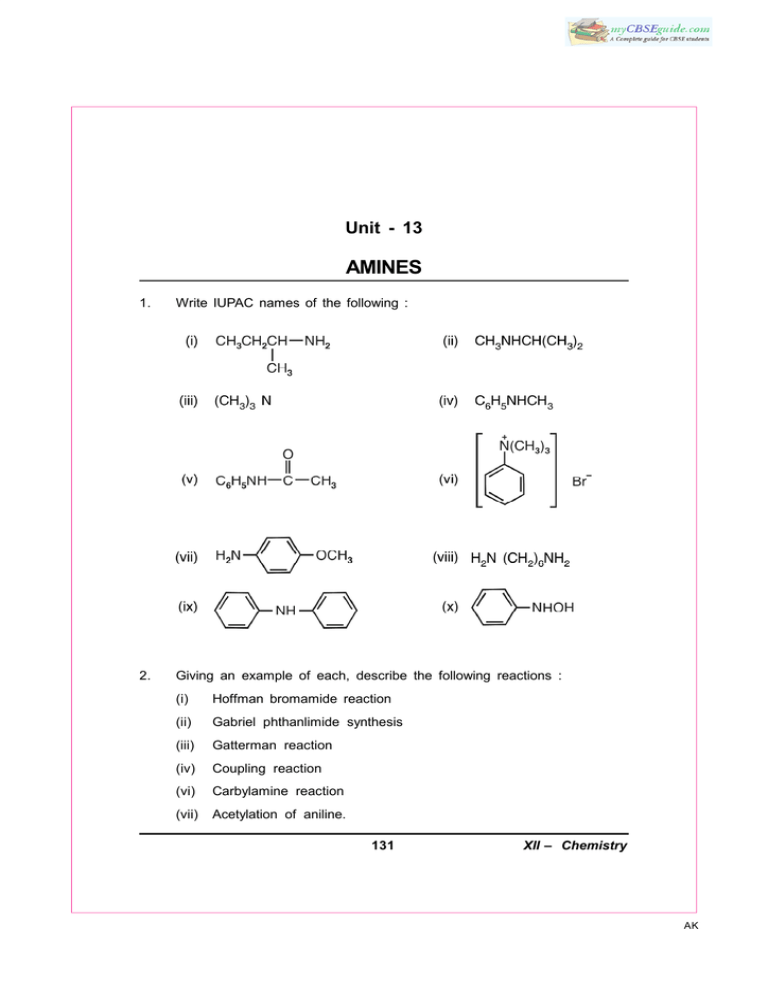
Unit - 13 AMINES 1. Write IUPAC names of the following : 2. Giving an example of each, describe the following reactions : (i) Hoffman bromamide reaction (ii) Gabriel phthanlimide synthesis (iii) Gatterman reaction (iv) Coupling reaction (vi) Carbylamine reaction (vii) Acetylation of aniline. 131 XII – Chemistry AK 3. Describe the Hinsberg’s test for identification of primary, secondary and tertiary amines. Also write the chemical equations of the reactions involved. 4. Arrange the following in the increasing order of given property indicated. 5. (i) C2H5NH2, (C2H5)2NH, (C2H5)3N and NH3, (Basic strength in aqueous solution). (ii) C2H5NH2, (C2H5)2NH, (C2H5)3N and CH3NH2. (Basic strength in gaseous phase). (iii) Aniline, p-toluidine, p-nitroaniline. (Basic strength). (iv) C2H5OH, (CH3)2 HN, C2H5NH2 (Boiling point) Identify A and B in the following reactions : (i) CH3CH2Cl + NH3 (Excess) (ii) CH3CH2Cl + NH3 373K → OH– A 373K → OH– (excess) 6. 7. How will you bring about the following conversions? (i) benzene to Aniline (ii) aniline to benzene (iii) ethanoic acid to ethanamine (iv) p-toluidine to 2-bromo-4-methylaniline. (v) methylbromide to ethanamine (vi) benzenediazonium chloride to nitrobenzene (vii) ethylamine to methylamine (ix) benzene to sulphanilic acid (x) hexanenitrile to 1-aminopentane. Write the products formed in the following sequence of reactions :– – Br /NaOH NaCN OH 2 CH CH l → A →C Partial hydrolysis→ B 3 2 132 XII – Chemistry AK 8. Identify the missing reagent/product in the following reactions : 9. Give one chemical test to distinguish between the following pairs of compounds : (i) methylamine and dimethylamine (ii) secondary and tertiary amines (iii) ethylamine and aniline (iv) aniline and benzylamine (v) methylamine and methanol (vi) methylamine and N, N-dimethylamine (vii) ethanol and ethanamine 133 XII – Chemistry AK 10. Explain why : (i) The C–N–C bond angle in trimethyl amine is 108° (ii) the quaternary ammonium salts having four different alkyl groups are optically active (iii) alkylamines are more basic than ammonia (iv) aniline cannot be prepared by Gabriel phthalimide synthesis (v) Garbriel phthalimide synthesis is preferably used for synthesising primary amines. (vi) ethylamine is soluble in water but aniline is not (vii) amines are soluble in dilute HCl. (viii) amines have lower boiling point than alcohols of comparable molecular masses. (ix) 1° amines have higher boiling points than 2° amines which in turn, are higher boiling than 3° amines. (x) The pKb value of benzeneamine is 9.33 while that of ammonia is 4.75. (xi) aniline does not undergo Friedel-Crafts reaction. (xii) aniline readily forms 2, 4, 6-tribromoaniline on reaction with bromine water. (xiii) sulphanilic acid is soluble in water. (xiv) methylamine in water reacts with ferric chloride to precipitate hydrated ferric oxide. (xv) diazonium salt of aromatic amines are more stable than the diazonium salts of aliphatic amines. (xvi) Although amino group is o, p-directing in aromatic electrophilic substitution reactions, aniline on nitration gives a substantial amount of m-nitroaniline. 11. Why do amines act as nucleophiles? Give example of a reaction in which methylamine acts as a nucleophile. *12. Three isomeric amines A, B and C have the molecular formula C3H9N. Compound A on reaction with benzene sulphonyl chloride forms a product which is soluble in NaOH. Compound B on reaction with benzene sulphonyl chloride forms a product which is insoluble in NaOH and compound C 134 XII – Chemistry AK does not react with benzene sulphonyl chloride. Identify A, B and C. [Ans. : (A) CH3CH2CH2NH2 (B) CH3CH2NHCH3 (C) (CH3)3N] 13. An organic compound A (C2H3N) is used as a solvent of choice for many organic reactions because it is not reactive in mild acidic and basic conditions. Compound A on treatment with Ni/H2 forms B. When B is treated with nitrous acid at 273K, ethanol is obtained. When B is warmed with chloroform and NaOH, a foul smelling compound C formed. Identify A, B and C. [Ans. : (A) CH3CN (B) CH3CH2NH2 (C) CH3CH2NC 14. An organic compound [A] C3H6O2 on reaction with ammonia followed by heating yield B. Compound B on reaction with Br2 and alc. NaOH gives compound C (C2H7N). Compound C forms a foul smelling compound D on reaction with chloroform and NaOH. Identify A, B, C, D and the write the equations of reactions involved. [Hint : (A) CH3CH2COOH (B) CH2CH2CONH2 (C) CH3CH2NH2 (D) CH3CH2NC.] 135 XII – Chemistry AK
